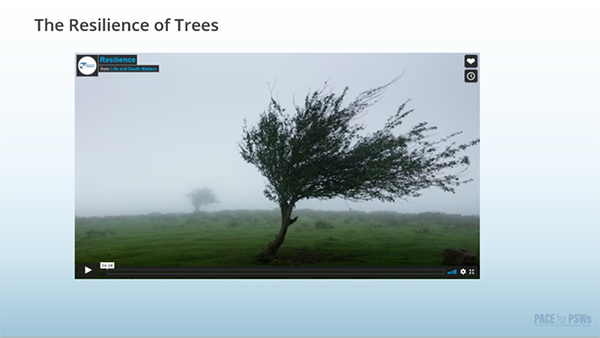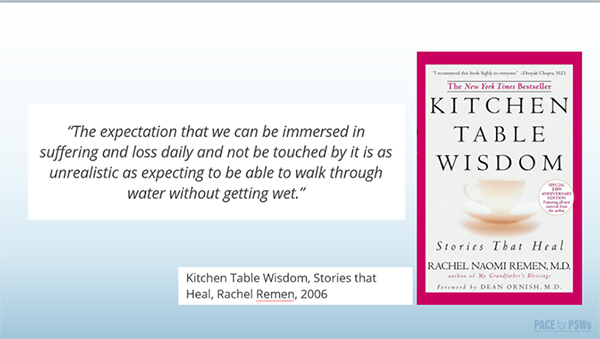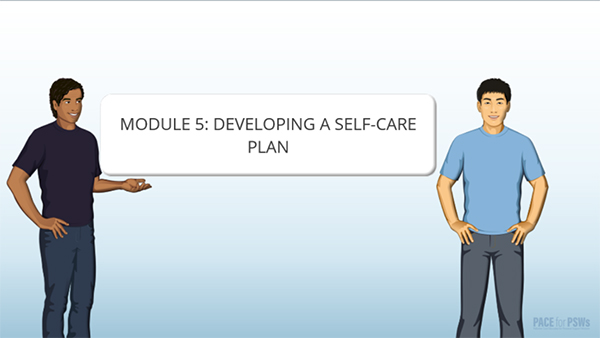Module 1: Understanding the Role of Resilience
What is resiliency and how does it benefit PSWs who are providing care for a person who is dying and their family? Learn how to build and maintain your resilience.

Summary
Module 1 explores the concept of resilience, using trees as an example of how resilience benefits all people, including caregivers. Develop practical ways to build resilience as part of your daily life.
Module 2: Exploring Stress and Compassion Fatigue
Have you ever stopped to consider the nature of stress? Explore causes and effects of stress and learn about compassion fatigue.

Summary
This fabulous quote from Rachel Ramen reminds us that as caregivers, we will be affected by what we do, witness and experience. In this module, you will learn how it is possible that stress can be both a positive and negative influence in life. You will explore the sources of stress in your life and evaluate where you are on the continuum of compassion fatigue.
Module 3: Assessing Self-Care and Compassion Satisfaction
In this module, you learn why you need to put on your own oxygen mask first. Assess what are already doing to support your health and identify your sources of compassion satisfaction.

Summary
Self-care practices need to support the many aspects of you. Learn what types of activities can be considered self-care and the different aspects of you that need care. Explore the concept of compassion satisfaction.
Module 4: Being Mindful and Managing Expectations
Explore ways to use mindfulness in every day life. Understand the role of managing expectations in decreasing stress.

Summary
Supporting yourself with self-care includes learning how to be mindful in the small and large parts of your daily life. Explore an often overlooked aspect of self-care - managing expectations of others and yourself.
Module 5: Developing a Self-Care Plan
Create a self-care plan that is tailored to meet your needs, interests and availability. Develop your advance care plan as part of your self-care plan.

Summary
In this final module, you will use this information you gathered about yourself and your preferences through this course, e.g., self-care inventory, level of compassion fatigue, to develop a self-care plan that meets your interests, needs and abilities. As a second part of self-care planning, you'll create an advance care plan, which will help caregivers know what your care wishes if there comes a time when you can no longer communicate. As we have learned through COVID over the past years, or when someone sustains life-threatening injuries, it is never to early to create an advance care plan.
Module 6: Course Quiz
Welcome to Module 6: Course Quiz!
Requirements: Grade of 70% or greater to pass the course.
There are 3 opportunities to pass the quiz.
The answer key is shown only after you have passed the quiz.
Check here before starting the quiz
Have you viewed, or clicked on all slides of all modules?
If you have missed any slides, the quiz will NOT be graded.
You will know you have missed slides if you submit the quiz for grading, and you do not get a grade for it within minutes.
How to fix this
1. Go back into the modules, select "Menu" in the top left (red circle in image below). This view displays all the slides in the module.
2. A viewed slide will have a check mark beside it (Red arrows are pointing at the check marks).
3. If a slide does not have a check mark beside it, click the title to set it as viewed. A check mark will appear.
4. Repeat this process for all modules of the course.
5. When finished, open the quiz module. You will now be able to submit the quiz for grading.

Good luck!